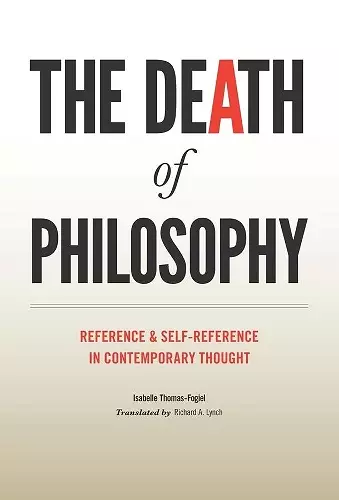The Death of Philosophy
Reference and Self-reference in Contemporary Thought
Isabelle Thomas-Fogiel author Richard A Lynch translator
Format:Hardback
Publisher:Columbia University Press
Published:3rd Jun '11
Currently unavailable, and unfortunately no date known when it will be back

"Isabelle Thomas-Fogiel provides the first extended analysis of the theme of the end, or "death" of philosophy, which has been on the agenda at least since early in the nineteenth century. The author, one of the most promising young French philosophers, writes clearly, persuasively and insightfully. She ranges widely over both continental and analytic sources, and concentrates well on arguments, weighing and evaluating different interpretations of major figures. This is an important book."
Philosophers debate the death of philosophy as much as they debate the death of God. Kant claimed responsibility for both philosophy's beginning and end, while Heidegger argued it concluded with Nietzsche. In the twentieth century, figures as diverse as John Austin and Richard Rorty have proclaimed philosophy's end, with some even calling for the advent of "postphilosophy." In an effort to make sense of these conflicting positions--which often say as much about the philosopher as his subject--Isabelle Thomas-Fogiel undertakes the first systematic treatment of "the end of philosophy," while also recasting the history of western thought itself. Thomas-Fogiel begins with postphilosophical claims such as scientism, which she reveals to be self-refuting, for they subsume philosophy into the branches of the natural sciences. She discovers similar issues in Rorty's skepticism and strands of continental thought. Revisiting the work of late-nineteenth and early-twentieth-century philosophers, when the split between analytical and continental philosophy began, Thomas-Fogiel finds both traditions followed the same path--the road of reference--which ultimately led to self-contradiction. This phenomenon, whether valorized or condemned, has been understood as the death of philosophy. Tracing this pattern from Quine to Rorty, from Heidegger to Levinas and Habermas, Thomas-Fogiel reveals the self-contradiction at the core of their claims while also carving an alternative path through self-reference. Trained under the French philosopher Bernard Bourgeois, she remakes philosophy in exciting new ways for the twenty-first century.
Isabelle Thomas-Fogiel provides the first extended analysis of the theme of the end, or 'death,' of philosophy, which has been on the agenda since at least the early nineteenth century. Thomas-Fogiel, one of our most promising young French philosophers, writes clearly, persuasively, and insightfully. She ranges widely over both continental and analytic sources and concentrates well on arguments, weighing and evaluating different interpretations of major figures. This is an important book. -- Tom Rockmore, Duquesne University, author of Kant and Idealism
ISBN: 9780231147781
Dimensions: unknown
Weight: unknown
360 pages